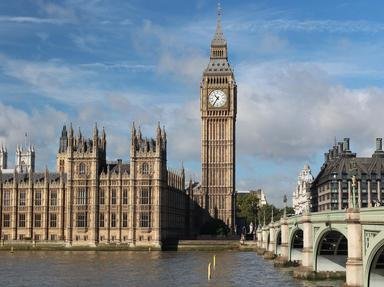Quiz Answer Key and Fun Facts
1. The Prime Minister who was already in office when Queen Victoria succeeded to the throne in 1837 quickly became the young queen's mentor and political advisor. He is also remembered for having been dismissed from office by the monarch and for his wife's affair with the poet, Lord Byron. Who was he?
2. Which Prime Minister, who was responsible for the repeal of the Corn Laws in 1846, remains best-known for his role in creating the modern police force while serving as Home Secretary in the 1820s?
3. Who was the Prime Minister who sat in the House of Commons during his first ministry (1846 to 1852) but was a member of the House of Lords by the time his second ministry began in 1865?
4. Edward Smith-Stanley was leader of the Conservative party for over 20 years and held the post of Prime Minister on three separate occasions during the Victorian period. However, his total time in that office was less than four years. By what title is this Prime Minister better known?
5. The Earl of which Scottish city held the post of Prime Minister from 1852 to 1855 as the head of a coalition government that took Britain into the Crimean War?
6. Which British Prime Minister, who died in office in 1865, was best known for his interest in foreign policy having held the post of Foreign Secretary for a total of about 15 years prior to taking the top job?
7. One of Queen Victoria's favourite Prime Ministers was the man who passed the Royal Titles Act of 1876 which granted Victoria the title of 'Empress of India'. He was also a noted novelist whose works included 'Vivian Grey', 'Coningsby' and 'Sybil'. Who was this multi-talented man?
8. A man who held the post of Prime Minister on four separate occasions during Queen Victoria's reign famously did not get on well with the formidable monarch. Which Prime Minister caused Queen Victoria to complain that "He always addresses me as if I were a public meeting"?
9. Which Victorian Prime Minister simultaneously held the post of Foreign Secretary for most of his three terms in office and was the last Prime Minister to have led his government solely from the House of Lords?
10. The last of the ten men to take a trip to visit Queen Victoria at Buckingham Palace and be confirmed as Prime Minister was an extremely wealthy Scottish peer who lasted just over a year in the job and was spectacularly unsuccessful at it. Who was he?
Source: Author
Fifiona81
This quiz was reviewed by FunTrivia editor
stedman before going online.
Any errors found in FunTrivia content are routinely corrected through our feedback system.
